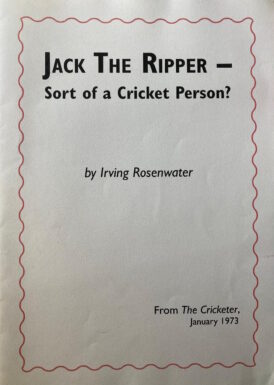Jack the Ripper: Sort of a Cricket Person?
Martin Chandler |Published: 2005
Pages: 3
Author: Rosenwater, Irving
Publisher: Private
Rating: 3.5 stars

Irving Rosenwater died on 30 January 2006. This A4 sized booklet has a note on the bottom of its back cover stating it was published in 2005 in an edition of 100 copies. The copy that I have is neither numbered nor signed, and indeed doesn’t have a limitation page.
I have pursued a career in the law all my adult life, and for many more of those years than I should have practiced my profession in the criminal courts, so I should declare an interest in true crime cases and investigation and detection generally.
The wider issue with this monograph surrounds the case of Jack the Ripper, the Whitechapel Murderer of the 1880s. As many will be aware there is a special genre of true crime writing inhabited by the self-styled ‘ripperologists’. Theories abound as to the identity of the mystery killer, ranging from members of the royal family down to the lowest of the underclass.
Of course no one was ever tried for the crimes, so none of the available evidence was ever tested in court. There is therefore much scope for rumour and innuendo to mix with the few known facts and this has led to a vast number of theories, zealously held and vociferously championed by those that propound them. Sadly for the ripperologists however the only theory that is in any way convincing is the one that concludes that the unmasking of Jack the Ripper is impossible.
For a cricketing bibliophile the more interesting question is what is this thing that I have in my collection. Despite not having a signature or a number it looks and feels exactly like a Rosenwater limited edition. It is clearly a project left unfinished, but the copy I have is the only one I have seen, begging the question as to why there aren’t 99 more?
That is one question I cannot answer, although I do know that the copy I have at one stage belonged to the noted collector, literary agent and brother of the famous comedian Tony, Roger Hancock, who died in 2011.
Re-reading the booklet now, three years after I first acquired it, and I have convinced myself that what I have is probably just a mock up, left unfinished due to its author’s ill health.
The article that the booklet contains is a straight reprint of a piece written by Rosenwater that appeared in the pages of The Cricketer in 1973. The cause of its being written in the first place was a book written by Daniel Farson and published in 1972 that concluded the Ripper was Montague Druitt.
Druitt was an interesting candidate. He was a good cricketer, though not one good enough to gain a blue at Oxford or to appear in a First Class fixture. Outside the game Druitt was a schoolmaster who didn’t teach, and a barrister who, it seems, was no great success in court either. He was found dead, drowned in the Thames, a month after the final Ripper murder.
Rosenwater’s article did something Farson had not done, and delved deep into Druitt’s cricketing connections. If anything the results of his research seem to undermine the case against Druitt, although at the end of the article Rosenwater still seems generally supportive of Farson,
Why did Rosenwater dig the article out 30 years later? The answer to that one seems to be because in 2005 a biography, Montague Druitt: Portrait of a Contender, was published by John Leighton. There must have been some discussion between Leighton and Rosenwater as the latter is mentioned in the former’s acknowledgments, although Leighton’s conclusions are at odds with those of Farson and, by association therefore, those of Rosenwater.
And that is why what I now believe I have is a mock up, as against that background I feel sure that in its finished form Rosenwater saw the blank first page of what I have as accommodating his thoughts on Leighton’s conclusions. What those might have been I, of course, know not, but I feel confident that Rosenwater would have, as he always did, ‘stuck to his guns’.






Leave a comment